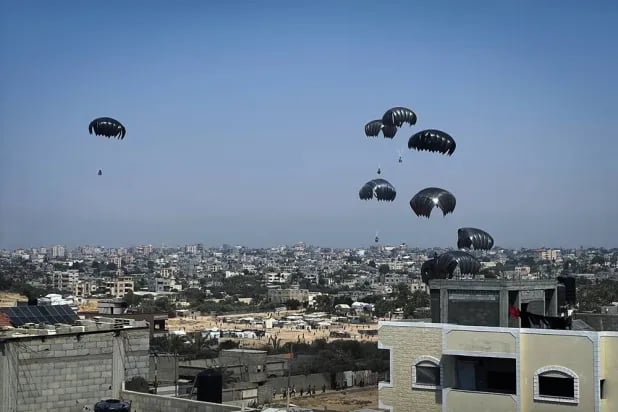Jordan and UAE Resume Humanitarian Airdrops, Delivering 25 Tonne of Aid to Gaza for First Time in Months
Jordan and the United Arab Emirates conducted a significant humanitarian airdrop over the Gaza Strip on July 27, 2025, marking their first such operation in several months. Using two C130 aircraft from the Royal Jordanian Air Force and one from the UAE Air Force, the mission parachuted 25 tonne of food and essential humanitarian supplies into the besieged territory.
INTERNATIONAL
Thinkbrief
7/23/20252 min read


This joint operation was a direct response to the deepening humanitarian crisis in Gaza, where the local population has endured mass starvation and immense hardship due to prolonged restrictions and hostilities.
The effort was coordinated in partnership with the Jordan Hashemite Charity Organisation and reflected ongoing cooperation between Jordan, the UAE, and international agencies. Both nations emphasized that airdrops are only a stopgap measure, providing rapid relief to populations in areas inaccessible by ground routes. Officials stated that ground convoys remain the primary and most effective way to deliver substantial volumes of aid, but ongoing violence and logistical obstacles have hindered overland shipments.
The airdrop occurred as Israel announced a daily 10-hour pause in military operations within key zones of Gaza, including Al-Mawasi, Deir al-Balah, and Gaza City, to facilitate the passage of humanitarian aid convoys. These limited halts in fighting were implemented in response to mounting international criticism and outcry over the acute hunger gripping Gaza’s 2.2 million residents. Aid groups have described the situation as unprecedented, warning of mass starvation and noting that, according to the Gaza Health Ministry, at least 127 people, including 85 children, have died of malnutrition since the conflict began nearly two years ago.
The UAE’s Foreign Minister, Sheikh Abdullah bin Zayed Al-Nahyan, underscored the critical and unprecedented level of need in Gaza and announced the immediate resumption of air drops. The joint airdrop was welcomed by international aid organizations, who called for greater and more consistent access for humanitarian efforts beyond isolated air missions.
Despite the swift delivery of supplies, the airdrop was marred by logistical challenges. Local health officials in Gaza City reported at least 10 injuries caused by civilians scrambling for the parachuted aid packages. These incidents highlight the difficulties and risks inherent in aerial deliveries, especially in densely populated and desperate areas.
Jordan and the UAE have a history of conducting such airdrops and broader relief missions to Gaza, with Jordan stating it has completed over 127 airdrops and more than 7,900 truck deliveries of aid since the outbreak of the war in October 2023. The renewed air missions come amid calls from the United Nations and nongovernmental groups urging for a sustained and expanded flow of aid, by land whenever possible, so that comprehensive relief can reach the hardest-hit communities across Gaza.
The airdrop stands as a vital, though temporary, effort to address the ongoing humanitarian disaster in Gaza, spotlighting the urgent need for regular, unimpeded delivery of food, medicine, and basic necessities to civilians suffering the consequences of a protracted conflict.